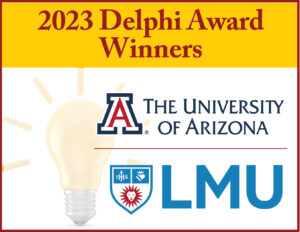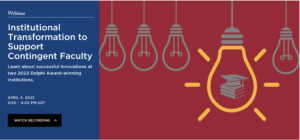Delphi Home | History | Tools & Resources | Books & Articles | News & Events | Delphi Award | FAQ
 Congratulations to our 2023 Delphi Award Winners:
Congratulations to our 2023 Delphi Award Winners:
University of Arizona and Loyola Marymount University
Learn more about their award-winning work transforming support for contingent faculty, here.
 The annual Delphi Award, now in its sixth year, presents a $15,000 cash award to two universities annually that support non-tenure-track, contingent and/or adjunct faculty in pursuing strategic priorities such as student learning and community engagement.
The annual Delphi Award, now in its sixth year, presents a $15,000 cash award to two universities annually that support non-tenure-track, contingent and/or adjunct faculty in pursuing strategic priorities such as student learning and community engagement.
The Delphi Award is generously sponsored by the TIAA Institute.
Learn more about Montgomery College and Dominican University of California’s winning 2022 Delphi Award programs by watching the April 2023 webinar (with AAC&U) here.
Past Delphi Award Winners
To learn more about the 2022 award-winning programs implemented by the Dominican University of California and Montgomery College, along with finalists UC-AFT and the University of Texas – San Antonio, click here. To access their case studies and access the case studies library for all Delphi Award winners and finalists since 2018, click here.
Background and Award Goals
Contingent, non-tenure-track and adjunct faculty employment practices, policies, programs and models on a majority of campuses are not aligned with the intended direction of college completion and student success initiatives and instead interfere with these goals, causing broad problems in higher education. With the goal of addressing this misalignment, the Delphi Award has two primary purposes:
- To encourage campuses, groups, departments or academic units to rethink contingent, non-tenure-track and adjunct faculty models, practices, programs and policies and
- To provide material support that helps colleges and universities overcome barriers to scaling the innovative faculty supports they have initiated.
Over the last two decades, the campus environments and faculty life have changed radically. Various studies have demonstrated how changes work directly against the types of support needed for student success, and especially for first-generation, underrepresented minority and low-income students.
- Currently, more than 70 percent of all teaching faculty at colleges and universities are on contingent, non-tenure-track or adjunct appointments.
- Many of today’s faculty drive between multiple campuses to piece together a full workload, lack an office on any campus for meeting with students and are generally not compensated for holding office hours or answering student emails.
- Contingent faculty generally have minimal time to prepare for classes and are often hired days before the class starts.
- Often, contingent faculty members are left out of discussions and planning around curriculum or broader program and college goals.
- Typically, contingent faculty are excluded from professional development where they might participate in discussions about pedagogies that support student success such as collaborative or active learning.
- Contingent faculty have limited information about the students on campus because they are not invited to or compensated for attending orientations or sessions where information about students and their background are shared.
The purpose of the Delphi Award is to support policies, practices and programs that ameliorate the issues facing contingent, non-tenure-track and adjunct faculty. This is particularly important because faculty bring assets and benefits to campuses, departments and academic units but are often prevented from using their talents effectively to support students and contribute to institutional priorities aligned with improving campus(es) and contributing to the learning mission of higher education.
We hope to select winners that have made alterations in:
- Practice (e.g., appropriate orientations, responsible hiring processes, feedback and evaluation, prioritization of issues related to contingent faculty)
- Policies (e.g., promotion and advancement, participation in governance, compensation, academic freedom protections)
- Programs and Services (e.g., mentoring, leadership development, professional development processes)
- Implementation of new faculty models (e.g. a new contract type or model of faculty beyond the adjunct or research-intensive faculty model. See the Adapting by Design Report for examples.)
For further ideas or to see if the work you are doing might be applicable for this award, see the case studies on our website.
Who Can Apply
We seek applications from a wide range of groups at multiple levels who have made changes to support contingent, non-tenure-track and/or adjunct faculty. We seek applications from individuals and small groups as well as larger groups and organizations (e.g. associations, disciplinary societies, consortia).
Applicants are not limited to colleges or universities, but we do require that applicants show they are connected to and having an impact on colleges or universities, given that colleges and universities are the primary contexts wherein contingent, non-tenure-track and adjunct faculty do their work (see our criteria for award for details). Above all, we seek applications that demonstrate concrete changes that support contingent, non-tenure-track and adjunct faculty.
The funds will be provided as an award. There are no restrictions on the timing for use of the funds. We are also not expecting any reporting. We only ask that the funds are used toward your programs supporting your non-tenure-track faculty.
If you have questions about your or your group’s eligibility for the Delphi Award, please send us an email at pullias@usc.edu.
Entry Guidelines / How to apply
1. Review the Award application guidelines by clicking on this PDF. Make sure to review what information must be included in the uploads.”
2. Beginning on February 15, 2023, you can review the 2023 Delphi Award Application and prepare your answers, including a description of your program, policy, practice, or model.
3. Complete and submit your application online via the Delphi Award application form. The application window for the 2023 Award is now closed.
Criteria for Award
The following criteria will be used in evaluating applications:
- Evidence that the program, policy or practice is designed in keeping with strategic institutional priorities aligned with improving campus(es) and contributing to the learning mission of higher education.
- Evidence that the program, policy or practices were enacted in partnership or with support from one or more host colleges or universities. For example, you may submit letters of support from institutional representatives or other evidence of how your changes are impacting colleges or universities.
- Evidence that the program, policy or practice is assisting contingent, non-tenure-track and adjunct faculty in being more effective in their work.
- Evidence illustrating how the program, policy or practice can be scaled, replicated and/or emulated at other institutions (e.g., that other institutions might be able to adopt the approach with minimum difficulty).
- Evidence that the program, policy, or practice has been designed in collaboration with the contingent, non-tenure-track and/or adjunct faculty that the program, policy or practice is aimed at.
- Evidence that the program, policy or practice is being institutionalized and will be sustained. Evidence may entail inclusion in strategic plans, stated leadership commitment, fundraising and development aimed at supporting the practice, or other demonstrations of continuity beyond the first year of implementation.
- A theory of action that explains how the program, policy, practice or model supports contingent, non-tenure-track and/or adjunct faculty, and how that support helps faculty in turn contribute to institutional priorities aligned with improving campus(es) and contributing to the learning mission of higher education.
We also encourage applicants to include the following items, if relevant:
- Evidence that the program, policy or practice is impacting student success. If including such evidence, please also articulate your definition of student success. For example, evidence of student success might include graduation rates, persistence rates, course passing rates, GPA or other measures of student success.
- Evidence that the program, policy or practice has resulted in organizational learning for the institution/department/unit that has encouraged rethinking other policies, practices or programs.
We do not anticipate that every program, policy, model or practice will demonstrate all the criteria above. Each submission will be reviewed holistically with these criteria in mind. We are interested in innovations that may not follow known existing best practices.
If you have questions about the criteria for the Delphi Award, please send us an email at pullias@usc.edu.
Selection Process
The Delphi Project/AAC&U invite nominations for this award but also encourage direct applications for this award. Nomination is not required to apply. Nominated entities will be invited to fill out an application.The Delphi Project will convene a panel of judges familiar with faculty policies, practices and programs to review the applicants. The panel will review the qualified applicants, evaluate them against the stated criteria, and make a decision by September of the application year. At that point, the winners will be notified and asked to attend the AAC&U annual conference the following January to receive the award.
Stipulations
Award funding should be used to support on-going implementation of the policy if in process, to expand the policy or practice, or to develop and support a new policy or practice for faculty. Award recipients must make themselves available to the Delphi Project research team for subsequent questions, interviews, and to provide additional data collection regarding their activities.
Advisory Board
Angel Royal – American Association of Community Colleges
Ashley Finley – Association of American Colleges and Universities
Cynthia Wilson – League of Innovation
Gayle Kiser – College and University Personnel Association for Human Resources
Jonathan Iuzzini – Achieving the Dream
Maria Maisto – New Faculty Majority
Nikki Edgecombe – Community College Research Center, Teachers College, Columbia University
Questions? Contact The Delphi Project at pullias@usc.edu.
Partner
![]()
American Association of Colleges and Universities AAC&U is the leading national association dedicated to advancing the vitality and public standing of liberal education by making quality and equity the foundations for excellence in undergraduate education in service to democracy. Its members are committed to extending the advantages of a liberal education to all students, regardless of academic specialization or intended career. Founded in 1915, AAC&U now comprises 1,400 member institutions—including accredited public and private colleges, community colleges, research universities, and comprehensive universities of every type and size.
AAC&U functions as a catalyst and facilitator, forging links among presidents, administrators, faculty, and staff engaged in institutional and curricular planning. Through a broad range of activities, AAC&U reinforces the collective commitment to liberal education at the national, local, and global levels. Its high-quality programs, publications, research, meetings, institutes, public outreach efforts, and campus-based projects help individual institutions ensure that the quality of student learning is central to their work as they evolve to meet new economic and social challenges.
Information about AAC&U can be found at www.aacu.org.
Sponsor
![]() The TIAA Institute helps advance the ways individuals and institutions plan for financial security and organizational effectiveness. The Institute conducts in-depth research, provides access to a network of thought leaders, and enables those it serves to anticipate trends, plan future strategies and maximize opportunities for success. To learn more about our work and engage with our community of thought leaders, please visit our website at www.tiaainstitute.org and follow us on Twitter at @TIAAInstitute.
The TIAA Institute helps advance the ways individuals and institutions plan for financial security and organizational effectiveness. The Institute conducts in-depth research, provides access to a network of thought leaders, and enables those it serves to anticipate trends, plan future strategies and maximize opportunities for success. To learn more about our work and engage with our community of thought leaders, please visit our website at www.tiaainstitute.org and follow us on Twitter at @TIAAInstitute.
